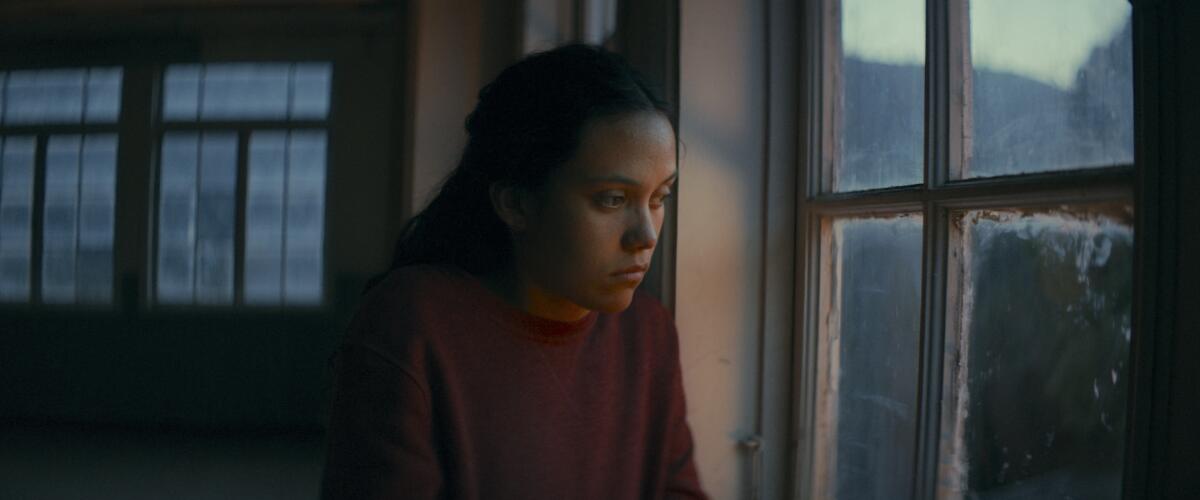Review: By any means necessary, Chilean drama ‘Blanquita’ chronicles a victim’s fight

- Share via
If a series of less-than-upright decisions culminate in a sliver of fairness for those among the most vulnerable, would we agree with the old adage that the end justifies the means?
Such is the crux of the sobering Chilean drama “Blanquita,” that country’s current Oscar entry for international feature. Inspired by real events from 2003, writer-director Fernando Guzzoni’s fictionalized entanglement of ambiguous actions and unspeakable impunity operates with a taut assertiveness devoid of all emotional artificiality. Set in the present, social media acts as an added element of tension.
For your safety
The Times is committed to reviewing theatrical film releases during the COVID-19 pandemic. Because moviegoing carries risks during this time, we remind readers to follow health and safety guidelines as outlined by the CDC and local health officials.
Single teenage mother Blanca (Laura López), affectionally nicknamed Blanquita, lives in a shelter for homeless youth run by the stern but dedicated Father Manuel (Alejandro Goic). Overnight, she becomes the star witness in a case against a powerful businessman accused of leading a pedophilia ring and luring marginalized minors into his opulent home.
Physical and psychological examinations corroborate the validity of her accusations of rape and bodily trauma, but some doubt her. López, a remarkable fist-time performer, maintains an immutable demeanor as Blanca recounts a lifetime of abuse, making the character near impossible to decipher and communicating the detachment she’s procured to survive.
The mere descriptions of the acts committed are sure to provoke a gut-wrenching reaction, even if expressed with the clinical matter-of-factness expected in official depositions. Guzzoni’s directorial hand chooses to move with restraint where others would exploit the despair on display for melodramatic manipulation. His focus is on the moral grays.
Deemed cognitively impaired due to long-term drug use, Carlos, a male victim and Blanca’s close friend, is prevented from testifying at the trial. His silencing ignites Blanca’s determination, because if the villains of the world can easily deny their crimes without remorse, those affected, she thinks, should also bend the facts or give them another vehicle.
Pressure mounts on everyone involved as holes are poked at the veracity of Blanquita’s claims. “I’m not strong, I’m weak!” she yells at Father Manuel, who tries to reassure her theirs is a righteous pursuit. But in this puzzle of monsters and do-gooders, Guzzoni also questions the priest’s staunch devotion to these kids banished by society’s indifference, even if there’s a glaring absence of context on how or why he chose this mission.
Religion further muddles the waters that divide right from wrong when Marco (Nicolás Durán), a romantic partner from Blanca’s past, pushes his way back into her life now as a member of an evangelical church. Though his intentions may be pure, the love he offers, secondary to his loyalty to the scripture, might get in the way of her victory in court.
With cinematographer Benjamín Echazarreta (“A Fantastic Woman”), Guzzoni shoots two group portraits, one of the unruly boys in Father Manuel’s care, for whom violence is the only language to engage with others. Later, another static shot sees Blanca posing with other girls who presumably share some of her experiences. In those brief instances, Guzzoni makes them, and their plight, visible. Blanquita’s fight includes all of them.
Yet, the most striking image in “Blanquita” comes early in the eponymous protagonist’s ordeal as she struggles for a shred of fairness, not only from the men she signaled but from everyone who’s wronged her since birth. Inside a restroom, as it dawns on her what she has set in motion, Blanca looks in the mirror where she is reflected multiple times. Her duplicates illustrate both that this plight isn’t only her own, and the many forms a reckoning can take.
It perhaps matters less who tells the truth, as long as justice prevails.
‘Blanquita’
In Spanish with English subtitles
Not Rated
Running time: 1 hours, 38 minutes
Playing: Starts Dec. 9, Laemmle Glendale
More to Read
Only good movies
Get the Indie Focus newsletter, Mark Olsen's weekly guide to the world of cinema.
You may occasionally receive promotional content from the Los Angeles Times.










